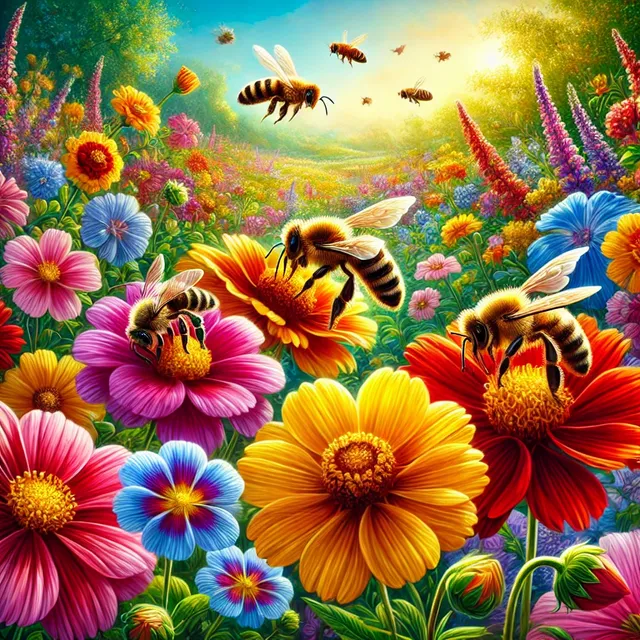🌍 The Beauty of the World with Flowers and Bees 🌸🐝

Introduction
Our world is a tapestry of vibrant colors and buzzing life, largely due to the harmonious relationship between flowers and bees. These tiny yet mighty pollinators play a crucial role in maintaining the health and beauty of our ecosystems. The symbiotic relationship between flowers and bees is not only fascinating but also vital for our survival.
The Dance of Flowers and Bees
The Role of Flowers
Flowers are nature's way of ensuring the reproduction of plants. Through their bright colors, alluring scents, and sweet nectar, flowers attract pollinators like bees. This relationship is essential for the production of seeds and fruits, which contribute to biodiversity and the food chain.
The Busy Bees
Bees are incredible creatures, performing a vital service known as pollination. As bees collect nectar and pollen from flowers, they inadvertently transfer pollen from one bloom to another, enabling plants to reproduce. This process supports the growth of fruits, vegetables, and nuts, making bees indispensable to agriculture and natural ecosystems.
Bees: The Unsung Heroes
Ecological Importance
Bees are key players in preserving ecological balance. They pollinate approximately 75% of the world's flowering plants, including around 35% of global food crops. This pollination supports the growth of diverse plant species, which in turn sustains various animal species that rely on these plants for food and habitat.
Economic Value
The economic impact of bees is staggering. Pollination by bees contributes billions of dollars to the global economy annually by boosting crop yields and quality. Without bees, the agricultural industry would face severe challenges, leading to higher food prices and reduced availability.
The Dire Consequences of Bee Decline
Theories and Research
Scientists have long warned about the catastrophic effects of bee population declines. Theories suggest that if bees were to disappear, the ripple effects would be devastating:
Food Shortages: Many of our staple crops, such as fruits, vegetables, and nuts, are heavily dependent on bee pollination. A decline in bee populations would lead to reduced crop yields and potential food shortages.
Biodiversity Loss: Bees play a crucial role in maintaining biodiversity. Their absence would disrupt ecosystems, leading to the decline of various plant and animal species.
Economic Impact: The loss of bees would have severe economic consequences, affecting farmers, food production, and global trade.
Albert Einstein's Warning
A quote often attributed to Albert Einstein, although not confirmed, captures the gravity of the situation: "If the bee disappears from the surface of the Earth, man would have no more than four years to live." This statement underscores the interconnectedness of our survival and the health of bee populations.
Protecting Our Pollinators
Conservation Efforts
To safeguard bees and ensure the continued beauty and health of our world, several conservation efforts are underway:
Habitat Restoration: Creating and preserving natural habitats for bees is crucial. Planting bee-friendly gardens and wildflower meadows can provide essential resources for pollinators.
Reducing Pesticides: Minimizing the use of harmful pesticides can protect bees from exposure to toxic chemicals.
Supporting Local Beekeepers: Buying honey and other products from local beekeepers helps support sustainable beekeeping practices.
Community Involvement
Individuals can play a significant role in bee conservation. Simple actions like planting diverse and native flowers, creating bee habitats, and spreading awareness about the importance of bees can make a difference.
Conclusion
The beauty of our world is deeply intertwined with the presence of flowers and bees. These small pollinators hold the key to our food security, ecological health, and economic stability. By understanding their importance and taking steps to protect them, we can ensure a thriving and vibrant planet for generations to come. Let's celebrate and safeguard the intricate dance between flowers and bees, cherishing the natural harmony that sustains life on Earth.